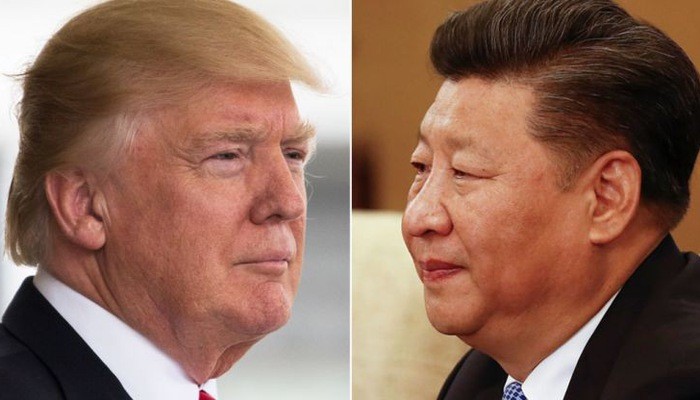(VOVWORLD) - Chinese Deputy Prime Minister Liu He is scheduled to attend a US-China trade negotiation in Washington on Thursday. While officials of both countries have expressed their hope for an agreement to halt the trade war, US President Donald Trump announced Monday he will raise tariffs on Chinese goods at the end of the week. Experts say Trump’s threat is a negotiating tactic.
 US President Donald Trump (L) and Chinese President Xi Jin Ping (Photo: CNBC) US President Donald Trump (L) and Chinese President Xi Jin Ping (Photo: CNBC)
|
The US President tweeted that tariffs of 10% on 200 billion USD worth of certain goods will rise to 25% on Friday. He also said he will soon slap a 25% tariff on 325 billion USD worth of Chinese goods that have not yet been taxed. The global market has been affected by Trump’s decision.
Effect of Trump’s threat
Stock markets fell worldwide in response to the tweet. Hong Kong’s Hang Seng index lost 3.7%, while the Shanghai Composite lost 5.3% and the Shenzhen Composite lost 5.5%. The S&P 500 was down 1.6% and interest rates on US government bonds were reduced as investors sought low risk assets.
China’s Central Bank is set to inject 41 billion USD of long-term capital into the market by reducing compulsory reserves for some small banks in a bid to lessen the impacts of abrupt changes. Bloomberg estimates that the current import tariffs will take away 0.5% of China’s GDP growth this year. If Trump raises tariffs on Chinese goods to 25%, China’s GDP growth will lose 0.9%, and if a 25% tariff is levied on all Chinese goods, China’s loss will be 1.5% of GDP.
Chinese officials expressed outrage and said China will not go to the negotiating table under US bullying. China’s chief negotiator Liu He will still travel to the US, but one day later than scheduled.
Gaining the upper hand
Trump’s announcement came at a moment when officials of both countries seemed optimistic about the coming negotiation, which they hope will pave the way for a summit between US President Donald Trump and Chinese President Xi Jin Ping in June.
Last September, when Chinese Deputy Prime Minister Liu He was to travel to the US, Trump suddenly announced a 10% tariff on 200 billion USD worth of Chinese goods. In return, China imposed an equivalent tariff on 110 billion USD worth of American goods. Deputy Prime Minister Liu’s trip to the US was cancelled and negotiations were halted.
After tit-for-tat tariffs, Trump and Xi decided to ease the tension and begin trade negotiations last December. Progress has been made but some technical issues remain unsolved. The biggest obstacles are intellectual property rights and compulsory technology transfer.
China was surprised by Trumps’ tweet. Analysts believe it is merely a negotiating tactic. The US’s first quarter GDP was 3.2% higher than predicted, which may have encouraged Trump to step up pressure on China.
The trade dispute has hurt both countries and slowed global economic growth. Liu’s decision to come to the US for the negotiation despite Trump’s threat is seen as a positive sign. Many observers are still hoping for a win-win agreement.